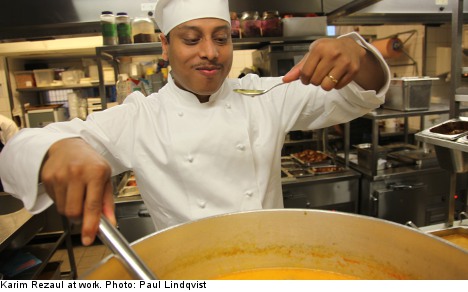“I married a woman from Åland, a Swedish-speaking island in Finland. We lived there for five years and during that time I was working as a consultant,” US-native Rhodri Williams, 43, tells The Local.
“A survival strategy really as there was no organization on Åland which does the kind of stuff that I have been doing.”
When Williams moved to Stockholm together with his family, he was expecting his career to stabilize, but breaking into the international law proved a greater challenge than he had expected.
“I thought that I would pretty quickly roll up the consultancy and maybe get a job here, in my branch, but it took quite a while,” he says. “When I did eventually get a job it was facilitated by the fact that I was hired by someone who I had worked with previously in Bosnia.”
Williams has almost 20 years experience working in the human rights field and it was the job in post-conflict Bosnia which helped to launch his international career.
“I was working there for an organization which was monitoring the situation for people who were forced out of their homes by the war. My specific job was to look at how they could get their homes back and then return if they wanted to return.”
He explains that the experience gained in Bosnia enabled him to establish himself as a consultant lawyer specializing in land rights issues, a job which has taken him to countries as far afield as Colombia, Cambodia, Turkey and most recently in Libya.
Identifying Sweden as a country which had a number of people working within the human rights field, he expected his broad experience to open doors but the delay in finding stable employment is a recurring theme of the interview.
“I think it takes a fairly long time to work your way in. Part of it was due to specific things. I work with development issues, human rights issues and right about the time I came, Sida was busy shedding a huge number of highly-qualified HR and development experts,” Williams says, referring to the Swedish International Development Cooperation Agency.
“I think it was a pretty saturated market, but I do think some of the stereotypes hold in the sense that it is easier to work your way into a job once people know you and they trust you.”
Williams explained that while Sweden has an established reputation working in the human rights field, the community in Stockholm remains small and in comparison to more international arenas such as New York City and Geneva the status of outsider is less expected.
“I think to an extent there is a greater degree of comfort with people you can place,” he says.
But despite the evident challenges for an American in Stockholm, Rhodri Williams managed to get that foot in the door by deploying the “survival strategy” that had served him so well on Åland. Furthermore, in his current role as a programme manager working with post-conflict Libya, working for a Swedish organization does have its advantages, he points out.
“Sweden has a very good reputation abroad, as a good broker which manages to be neutral in political disputes but concerned with human rights. I certainly have a lot less explaining to do saying that I come from a Swedish organization than (saying) I am American.”
Williams explains that while Geneva and New York may offer greater career opportunities, Sweden offers him and his young family a sound work-life balance and for a small country also has plenty to offer a human rights expert.
For those looking to get ahead in Sweden, in any field, Williams offered the following advice:
“It is quite important to be persistent, but not pushy, to engage and understand that simply by discussing issues of common interest with people doesn’t necessarily lead to further steps, such as an invitation to come in and talk over lunch.”
“To put it very colloquially, to get ahead you probably have to kiss a lot of frogs, do a lot of fika,” he says, adding that it is important to tailor a job application to what is needed and not just turn up and present what you can do.
Peter Vinthagen Simpson



 Please whitelist us to continue reading.
Please whitelist us to continue reading.
Member comments